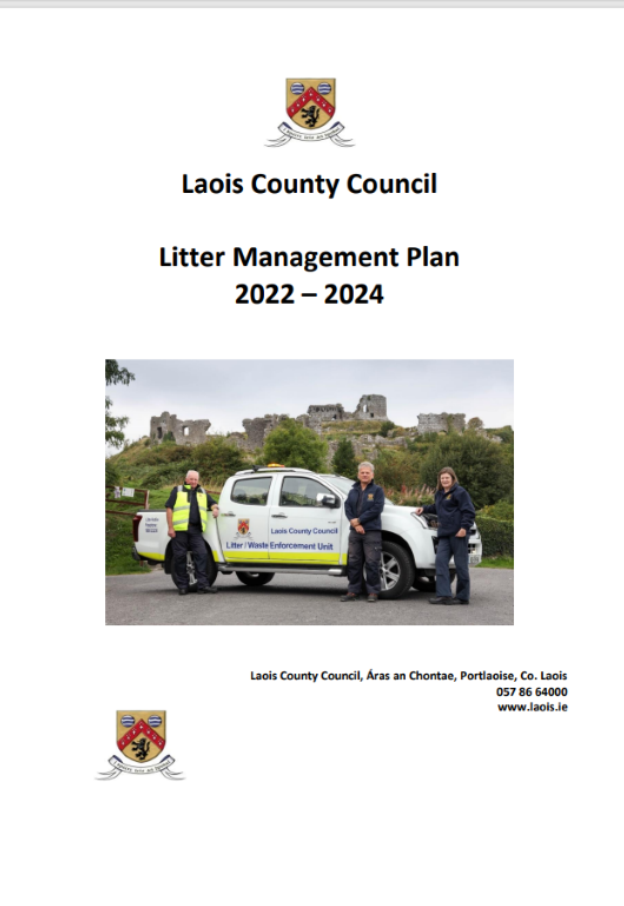Litter Management Plan 2022 – 2024
The Litter Management Plan was adopted by Laois County Council at their monthly meeting on the 1st March 2022. It can be viewed here: Litter Management Plan 2022 – 2024
Know your responsibilities for taking action against litter

Confidential Free Phone Litter Pollution Hotline 1800 32 32 30
Laying Down The Law
The Litter Pollution Act 1997 as amended brought in tougher litter laws to combat the problems of litter pollution more effectively.
Fines
Leaving or throwing litter in a public place is an offence, which can be subject to an on-the-spot fine of €150 or a maximum fine of €3,000 in court. The definition of litter is quite wide and extends beyond casual pieces of paper or cigarette ends to anything large or small, which is, or is likely to become, unsightly.
A person convicted of a litter offence may also be required by the court to pay the local authority’s costs and expenses in investigating the offence and bringing the prosecution.
Public Places
If you are the owner or the person responsible for a place to which the public has access you are obliged to keep the place litter free, regardless of how the litter got there. This applies to any public place, which may include the precincts of a shopping centre, a school campus, a public park, a train or bus station.
Litter in the vicinity of a business
A Local Authority can instruct the occupier of a business to take measures to prevent the creation of litter by his/her business within 100 metres of the business premises. Such measures may include for example the removal of litter and/or the provision of litterbins.
Occupiers of businesses situated beside a public road and within a speed limit area are responsible for keeping the footpath outside their business free of litter, regardless of how it got there. It is an offence to remove litter from a footpath by seeping it or placing it onto the road.
Private Property
The owner or occupier of property, which can be seen from a public place, is obliged to keep it free of litter. Basically, any outdoor area on your property that is visible from a public place must be kept free of litter.
Litter Black Spots
Where litter has accumulated on property for whatever reason and the litter is visible from a public place, the local authority can issue a notice to the owner or occupier requiring the prompt removal of the litter. Such a notice can also set down precautionary measures to be put in place to prevent a reoccurrence.
If a property owner or occupier fails or refuses to do anything that has been requested, the local authority has the power to do whatever is necessary itself and require the owner or occupier to pay all the costs involved.
Illegal Dumping
The litter laws have increased the powers of local authorities to combat the problem of illegal dumping of refuse and rubbish. Where a local authority finds material that is illegally dumped and establishes the identity of the owner of the material, that person will have a case to answer without necessarily having to be caught in the act.
Extra powers are also available to local authorities to require a householder or business operator to indicate how and where they are disposing of their waste. This is particularly relevant if the householder or business owner is not availing of a refuse collection service or bringing their waste to an authorised disposal facility.
If you see someone dumping illegally, report the matter to your local authority who will investigate and take any necessary enforcement action.
Major Events
The promoters or organisers of major events are required to ensure that they have litter control measures in place at the venue and in the surrounding vicinity before, during and after the event. This applies to football matches and other social and sporting events at which large crowds attend. It is possible that this task can be undertaken by the local authority but the promoter/organiser must bear the costs involved.
Mobile Food Outlets
Operators of mobile food outlets selling fast food or beverages, or other outlets such as those selling farm produce are obliged to provide suitable litterbins in the vicinity of their outlets. Also, they must clean up any litter arising from the operation of their outlets within a radius of 100 meters from their outlets.
Dog Fouling
Dog owners must now remove their pets’ waste from public places and dispose of it in a proper manner. This obligation applies to the following places:
- Public roads and footpaths
- Areas around shopping centres
- School/sports grounds
- Beaches
- The immediate area surrounding another person’s house
Advertising Flyers
The placing of advertising leaflets on car windscreens is prohibited and if you are proposing to distribute advertising leaflets in the street, you should first check with the local authority to see if they have introduced any local litter restrictions, which they are entitled to do.
Presenting your Refuse for Collection
Taking a few small precautions in the way you present your refuse for collection will help enormously in preventing the creation of litter. If you are not already using a wheelie-bin or ordinary refuse bin, you should use strong plastic bags and avoid using lightweight supermarket type bags. You should put out refuse for collection on the morning of the collection and not on the day or night before. The longer it is left out for collection the more likely it is to attract the unwanted attention of dogs, cats and birds.
It is an offence to dispose of your household refuse in street litterbins.
Who Enforces the Litter Laws?
Local authorities are responsible for implementing the litter laws in their own areas. This means they are responsible for the prevention and control of litter and they have the power to take enforcement action against individuals who break or ignore these laws. Gardai also have the power to issue on the spot fines for litter offences.
Local Authority Duties:
Litter Management Plans
Each local authority is obliged to prepare a litter management plan for its own area. This plan sets out their objectives to prevent and control litter as well as measures to encourage public awareness. The plan must also set out the measures and arrangements by which they intend to achieve their objectives. In preparing a litter management plan the local authority is obliged to consult with local community and voluntary interests before a plan is adopted by the council members.
Litter Control
They are responsible for keeping public place under their control including public roads, clear of litter as far as is practicably possible. This includes the arrangement of cleansing programmes and the provision and emptying of litterbins.
Tidy Towns
Litter will lose a town/village vital marks in the Tidy Towns Competition. If you live in a town or village you have a part to play in this competition. If a Tidy Town Committee is already up and running in your town/village, consider how you can help. Don’t just leave it to others. Remember, if you really have no time to spare to work with your Tidy Towns Committee, then your efforts to maintain your own premises litter free will help their efforts to keep your community more environmentally friendly for all to enjoy. If your town/village does not already have a Tidy Towns Committee why not consider forming one. The Tidy Towns unit in the Department of the Environment and Local Government, Custom House, Dublin 1 Tel (01) 6793377 can give you details of how to enter.


